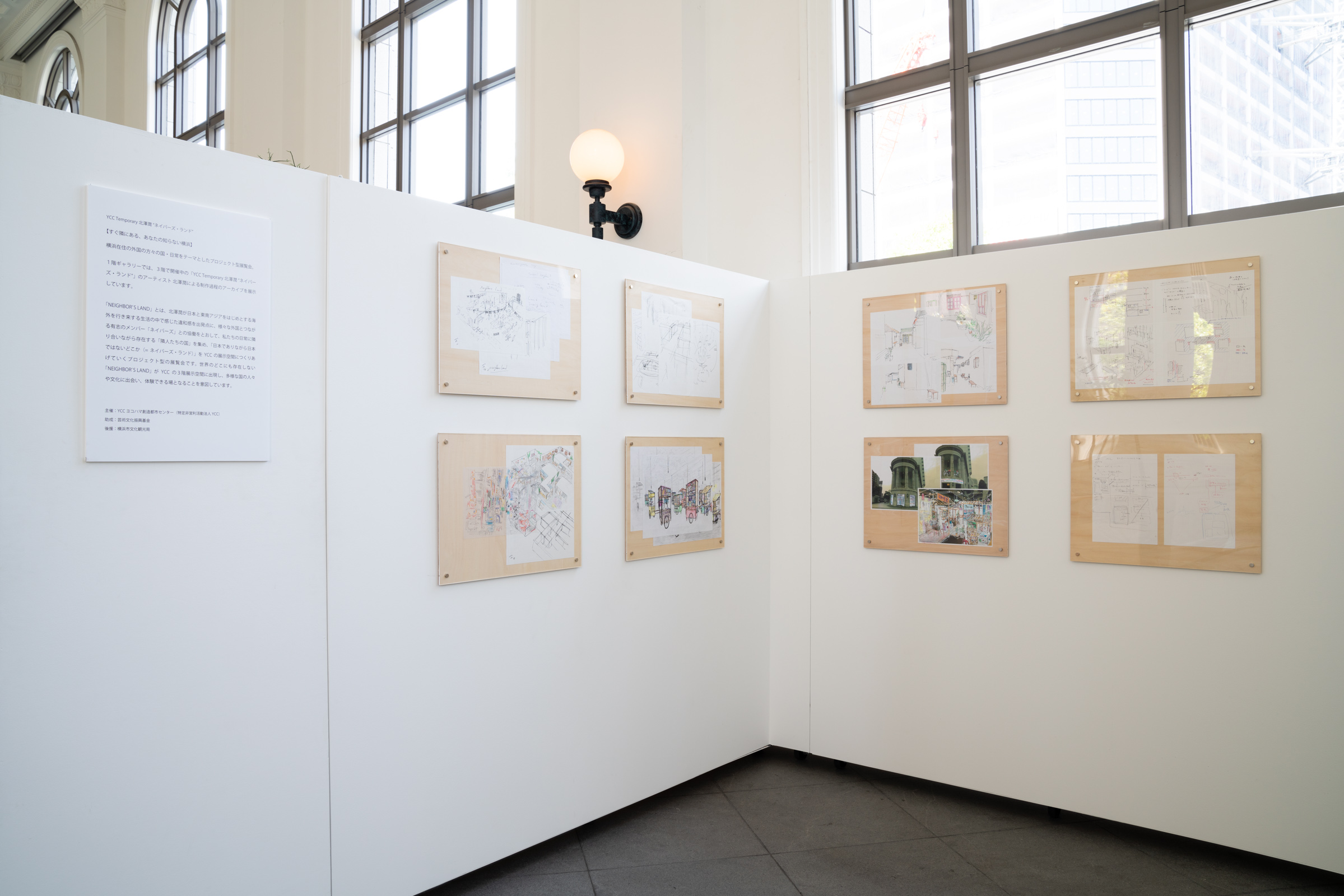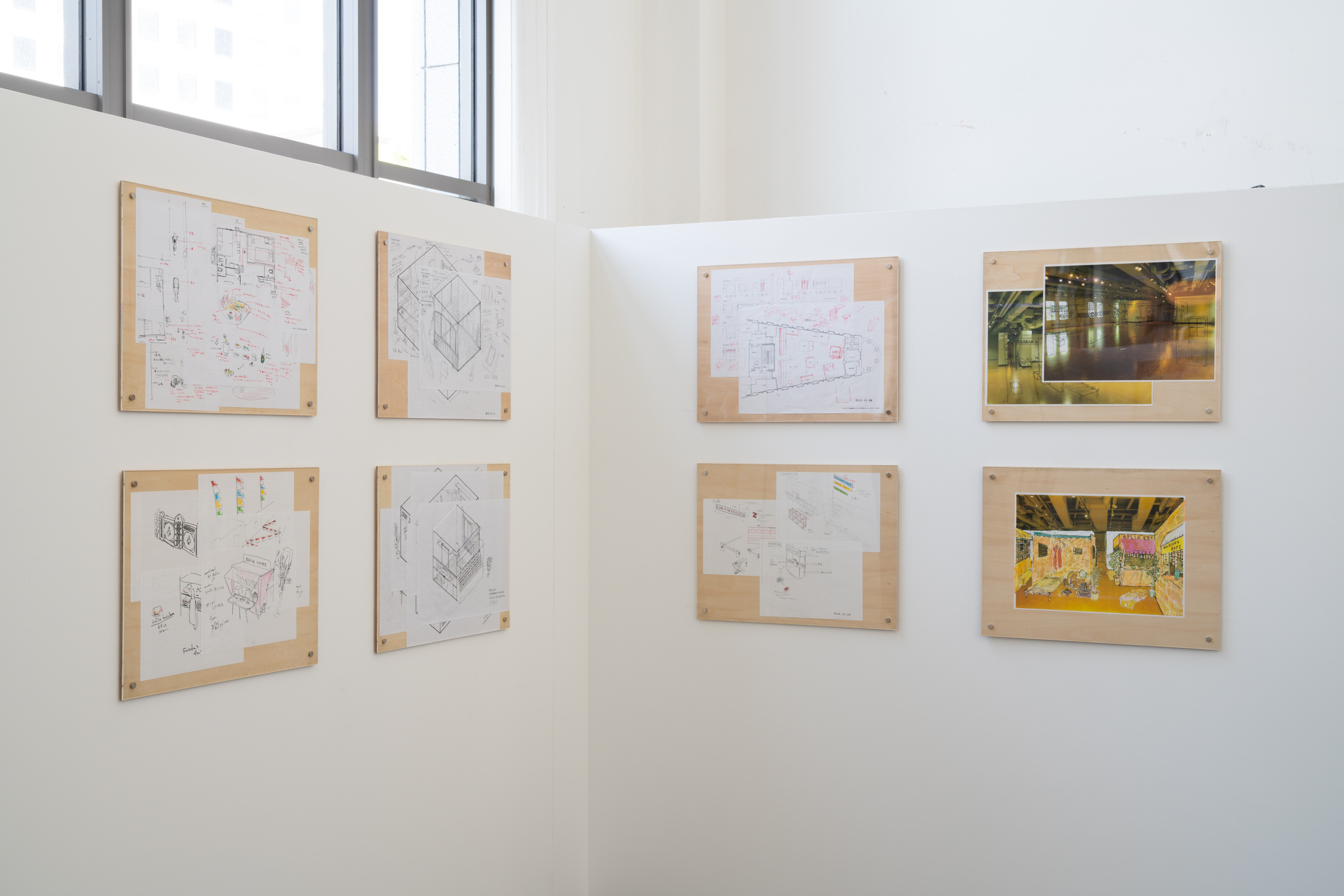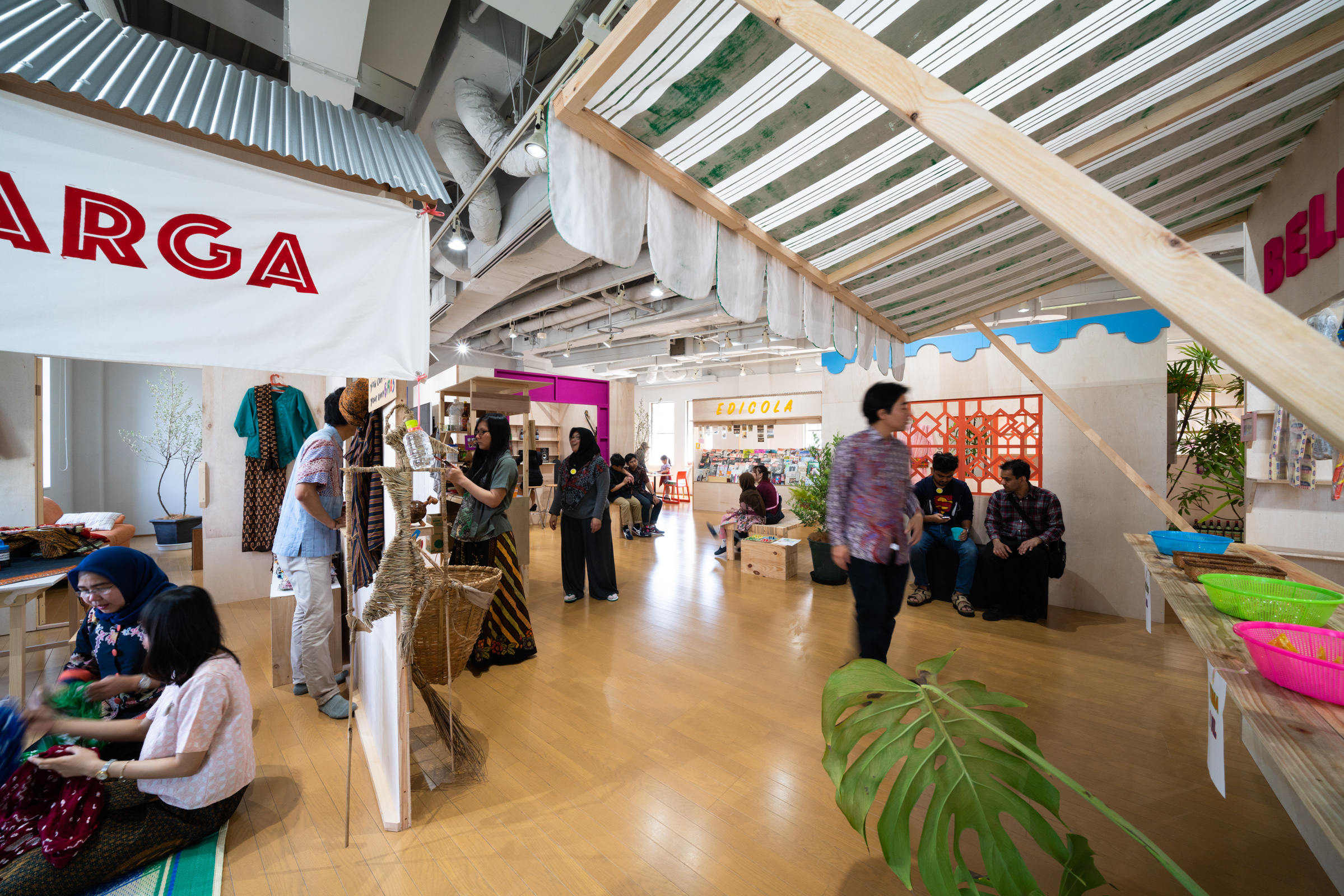
photo by Ken Kato
NEIGHBOR'S LAND
ネイバーズ・ランド
Statement
Tokyo and Jakarta
For several years now, I’ve been based in both Tokyo and Jakarta. For the first year, I was immersed in the chaos of Jakarta life. The intense humidity, the weather, the rain, the endless traffic jams, the feeling of loving wasted time. Very close friendships, shifting alleys and blatant politics. And several infections.
When I returned to Japan after a year, life in Tokyo, which I had been used to all my life, began to suffer. It's a new kind of disgust that's different from what I've been feeling so far It's not just a complaint that behavior that's possible over there isn't tolerated at all. I'm afraid that we may become unconscious of the fact that what we take for granted here is actually quite strange.
When abandon one and try to fit in with the other,
Or, when you rebel in the midst of one and try to remain the other,the "I" which already contains ambiguity has been silently eliminated.
Oarai town
There is a sensory dilemma that arises between two different countries and cultures. In order to overcome this personal problem, I decided to look for Indonesian people living in Japan. I wanted to meet someone who could relate to this issue.
The reason why I headed to Oarai Town along the coast to run my errands in Mito was because I learned that among the foreigners who work in the fish processing industry in this town, there are many Indonesians and that there is a community of about 300 people.
As I walked aimlessly through the harbor, I met a young man from Java. During the hour I was sitting on the bench talking to him, I was aware of the change in language, behavior and tension My "other" self has not shown its face in a long time and crossed the country.
He told me. Gudang Garam is sold at a convenience store just down the street, and the grueling daily grind of earning rent to live in Japan while attending language school, and also the silence on the street. He said “I will leave this town and go to Nagoya sooner or later. I have a friend in Java”. At the same time as the surprise of meeting and the pleasure of talking about it, I felt the rawness with which private issues are connected to social issues.
It's not just the two of us. I'm sure that many people in this society are feeling the same dilemma.
Yokohama city
Since deciding to do something at YCC, I've been walking around Yokohama from time to time. Is it because of an inexplicable connection with Yokohama and the world that I see foreign characters here and there, or is it just that I naturally pay attention to things that interest me now? Just recently, I knew that about 15,000 people, about 10% of the population in Naka-ku, Yokohama, are foreign residents. As I looked at the statistical data, I wondered how these people lived on the fringes of countries and cultures. I want to do something with them. I am imagining that they are my companions and seniors who have never spoken to me. That "they" is the so-called "immigrants".
NEIGHBOR'S LAND
By meeting the foreign residents of Yokohama and gathering their memory of "home" together, the foreign countries right next to our daily lives will come to the surface. Let's temporarily construct such a "homeland of hodgepodge" in the internal space of YCC. The foundation is the "street" of his hometown, as the young man who I met at Oarai town described it. I want to be liberated from invisible oppression in the temporary streets where haphazard activities come and go right next to each other. I don't know if they'll like it or not, but when they own that land that I named 《NEIGHBOR'S LAND》and project their homeland, the land becomes a country, and at the same time it goes beyond the country.
If there is another dilemma that arises, it may be when the "Japanese behavior" of the "we" who have stepped into the land is revealed and we feel that we have nowhere to go.
ステートメント
東京とジャカルタ
数年前から東京とジャカルタの両都市を拠点にしている。最初の一年間、混沌としたジャカルタの生活にひたすら染まった。強烈な湿度と天気雨、果てしない渋滞、無駄な時間を愛する感覚。近すぎるほどの友人関係、変幻自在の路地と露骨な政治。そして、幾度かの感染症。
一年を終えて帰国したとき、ずっと慣れ親しんできたはずの東京の生活が苦しくなった。これまで感じてきたものとは違う、あたらしい嫌気だ。あっちでは可能なふるまいが、ちっとも許されないことへの不満だけじゃない。こっちで当然のふるまいが、実はかなり特殊なのだということに無自覚になるのが怖い。
一方を捨てて、もう一方に合わせようと努力する時。または、一方の真っ只中でもう一方であり続けようと反抗する時。もうすでに両義性を含んだ「わたし」は、しずかに排除されている。
大洗町
ふたつの異なる国と文化のはざまで起こる、感覚のジレンマ。この私的な問題を乗り越えるために、日本で生きるインドネシア人を探してみることにした。この問題に切に共感する誰かと会いたかったからだ。
水戸での用事に合わせて海岸沿いの大洗町に向かった理由は、この町の水産加工業に従事する外国人のなかでインドネシア人が特に多く、300 人ほどのコミュニティが存在することを知ったから。
あてもなく港を歩いていると、ジャワ島出身の青年と出会った。ベンチに座って彼と話していた小一時間、言語とともに所作やテンションが様変わりしていることを自覚した。「もう一方」の自分が久しぶりに顔を出し、国を超える。
彼が教えてくれた。すぐ近くのコンビニにグダンガラムが売っていること、語学学校に通いながら日本で暮らすための家賃を稼ぐ過酷な毎日。路上の静けさ。「いずれこの町をはなれて名古屋に行くよ。ジャワの友達がいるんだ。」出会えた驚きや語り合えた喜びと同時に、私的な問題が社会の問題に接続する生々しさを感じた。二人だけじゃない。きっとこの社会でそれなりに多くの人が同じジレンマを感じているはず。
横浜
YCC で何かすると決まってから、ときどき横浜を歩くようになった。あちこちで異国の文字が目につくのは、「横浜と世界」の浅からぬ因縁からか、それともいまの自分の関心につながるものを自然と注視してしまっているだけか。横浜市中区に住む人口の約1 割、およそ1 万5 千人が外国人居住者と知ったのは最近のこと。統計データを眺めながら、この人たちは国や文化のはざまでどう生きているのだろうと考えていた。彼らと一緒に何かをしてみたい。うまく言葉にできないこの行き場の無さを共有する仲間であり、先輩のはずだ、と話したこともない彼らを勝手に想像している。その「彼ら」とはいわゆる「移民」と呼ばれる人たちのことだ。
隣人の土地/国
横浜に暮らす外国人居住者たちと出会い、それぞれの「故郷」を集めていくことで、日常のすぐ隣にある異国が浮かび上がってくるのではないか。そんな「寄せ集めの故郷」を、YCC の内部空間に一時的に構築してみよう。土台となるのは、あの青年が語った故郷の「路上」だ。無造作な営みがすぐ隣に行き交う仮設の路上のなかで、見えない抑圧から解放されたい/されてほしい。気に入ってくれるかどうかはわからないが、《ネイバーズランド》と名付けたその土地を、彼らが所有し故郷を投影するとき、土地は国になり、同時に国を超える。そこでまたあたらしいジレンマが生まれるとしたら、足を踏み入れた「わたしたち」の「日本のふるまい」があらわになり、行き場のなさを感じたときかもしれない。
東京とジャカルタ
数年前から東京とジャカルタの両都市を拠点にしている。最初の一年間、混沌としたジャカルタの生活にひたすら染まった。強烈な湿度と天気雨、果てしない渋滞、無駄な時間を愛する感覚。近すぎるほどの友人関係、変幻自在の路地と露骨な政治。そして、幾度かの感染症。
一年を終えて帰国したとき、ずっと慣れ親しんできたはずの東京の生活が苦しくなった。これまで感じてきたものとは違う、あたらしい嫌気だ。あっちでは可能なふるまいが、ちっとも許されないことへの不満だけじゃない。こっちで当然のふるまいが、実はかなり特殊なのだということに無自覚になるのが怖い。
一方を捨てて、もう一方に合わせようと努力する時。または、一方の真っ只中でもう一方であり続けようと反抗する時。もうすでに両義性を含んだ「わたし」は、しずかに排除されている。
大洗町
ふたつの異なる国と文化のはざまで起こる、感覚のジレンマ。この私的な問題を乗り越えるために、日本で生きるインドネシア人を探してみることにした。この問題に切に共感する誰かと会いたかったからだ。
水戸での用事に合わせて海岸沿いの大洗町に向かった理由は、この町の水産加工業に従事する外国人のなかでインドネシア人が特に多く、300 人ほどのコミュニティが存在することを知ったから。
あてもなく港を歩いていると、ジャワ島出身の青年と出会った。ベンチに座って彼と話していた小一時間、言語とともに所作やテンションが様変わりしていることを自覚した。「もう一方」の自分が久しぶりに顔を出し、国を超える。
彼が教えてくれた。すぐ近くのコンビニにグダンガラムが売っていること、語学学校に通いながら日本で暮らすための家賃を稼ぐ過酷な毎日。路上の静けさ。「いずれこの町をはなれて名古屋に行くよ。ジャワの友達がいるんだ。」出会えた驚きや語り合えた喜びと同時に、私的な問題が社会の問題に接続する生々しさを感じた。二人だけじゃない。きっとこの社会でそれなりに多くの人が同じジレンマを感じているはず。
横浜
YCC で何かすると決まってから、ときどき横浜を歩くようになった。あちこちで異国の文字が目につくのは、「横浜と世界」の浅からぬ因縁からか、それともいまの自分の関心につながるものを自然と注視してしまっているだけか。横浜市中区に住む人口の約1 割、およそ1 万5 千人が外国人居住者と知ったのは最近のこと。統計データを眺めながら、この人たちは国や文化のはざまでどう生きているのだろうと考えていた。彼らと一緒に何かをしてみたい。うまく言葉にできないこの行き場の無さを共有する仲間であり、先輩のはずだ、と話したこともない彼らを勝手に想像している。その「彼ら」とはいわゆる「移民」と呼ばれる人たちのことだ。
隣人の土地/国
横浜に暮らす外国人居住者たちと出会い、それぞれの「故郷」を集めていくことで、日常のすぐ隣にある異国が浮かび上がってくるのではないか。そんな「寄せ集めの故郷」を、YCC の内部空間に一時的に構築してみよう。土台となるのは、あの青年が語った故郷の「路上」だ。無造作な営みがすぐ隣に行き交う仮設の路上のなかで、見えない抑圧から解放されたい/されてほしい。気に入ってくれるかどうかはわからないが、《ネイバーズランド》と名付けたその土地を、彼らが所有し故郷を投影するとき、土地は国になり、同時に国を超える。そこでまたあたらしいジレンマが生まれるとしたら、足を踏み入れた「わたしたち」の「日本のふるまい」があらわになり、行き場のなさを感じたときかもしれない。
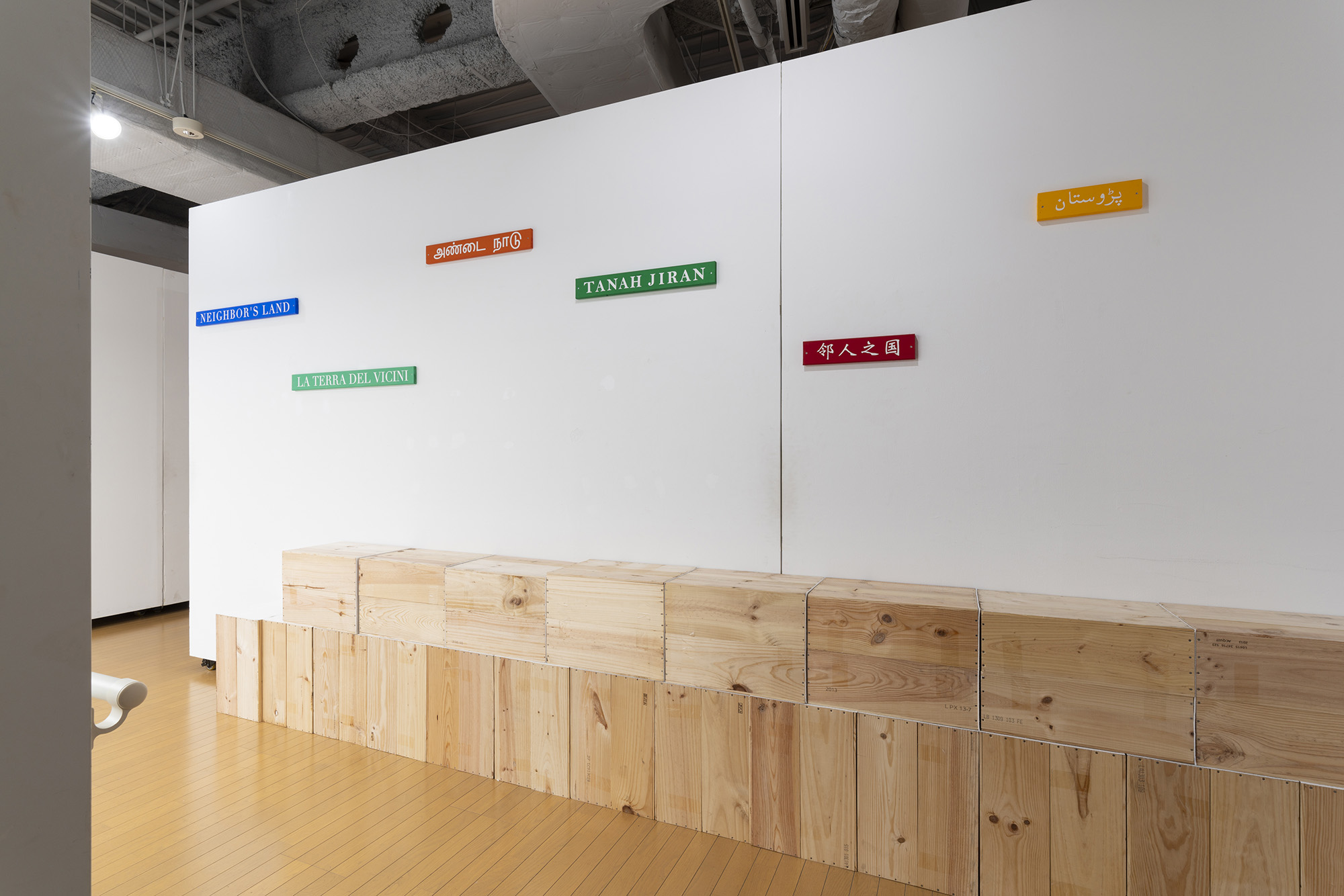
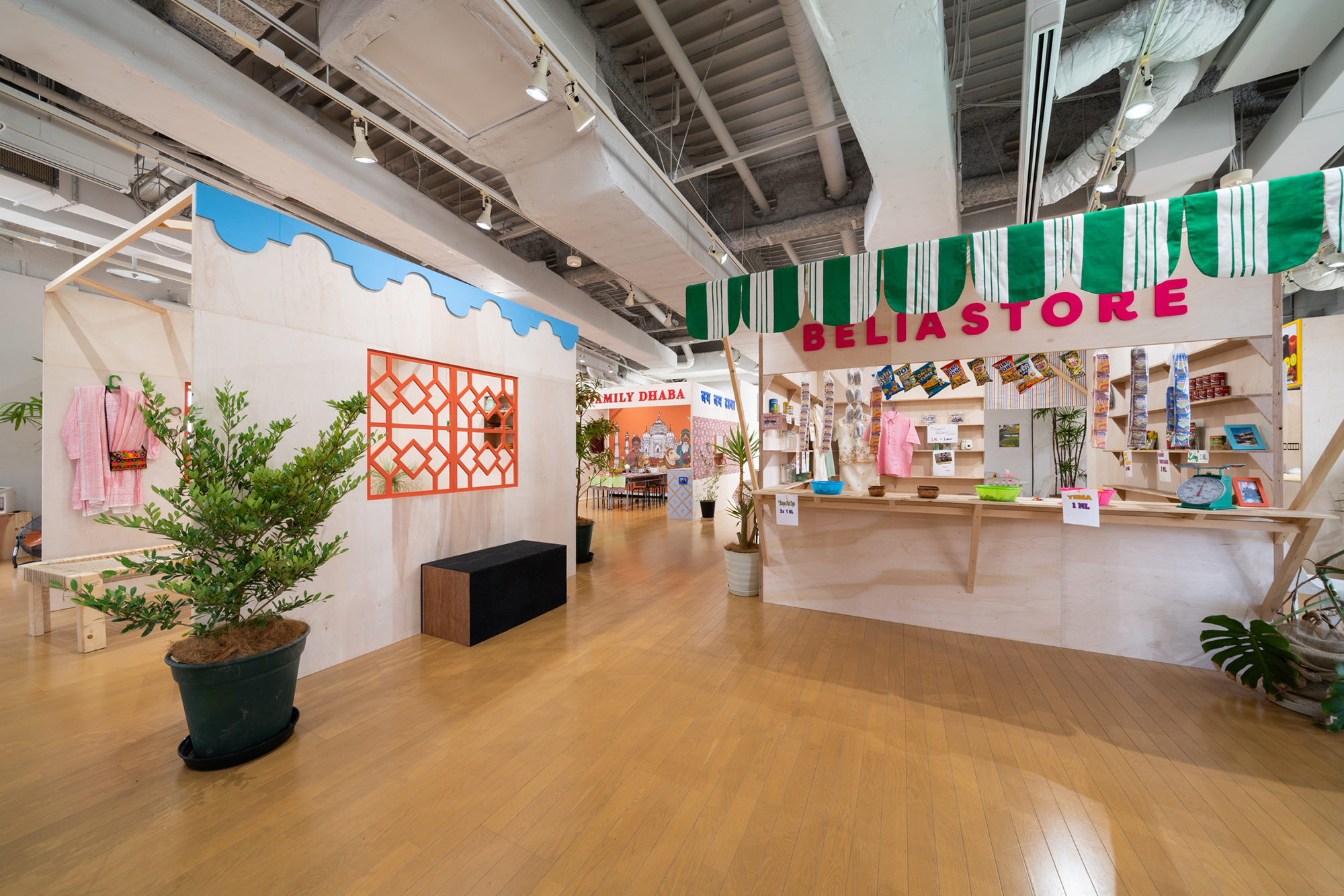
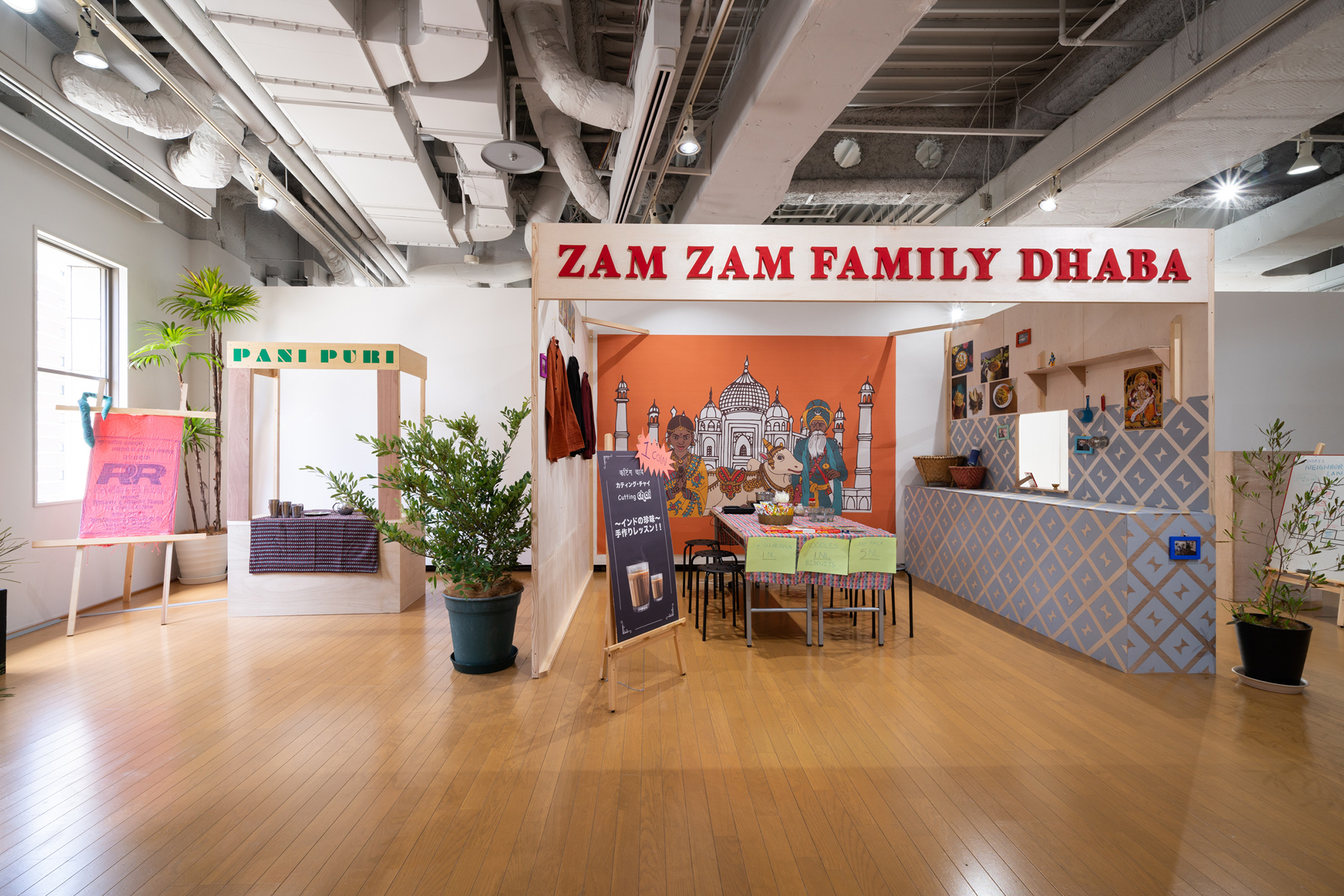
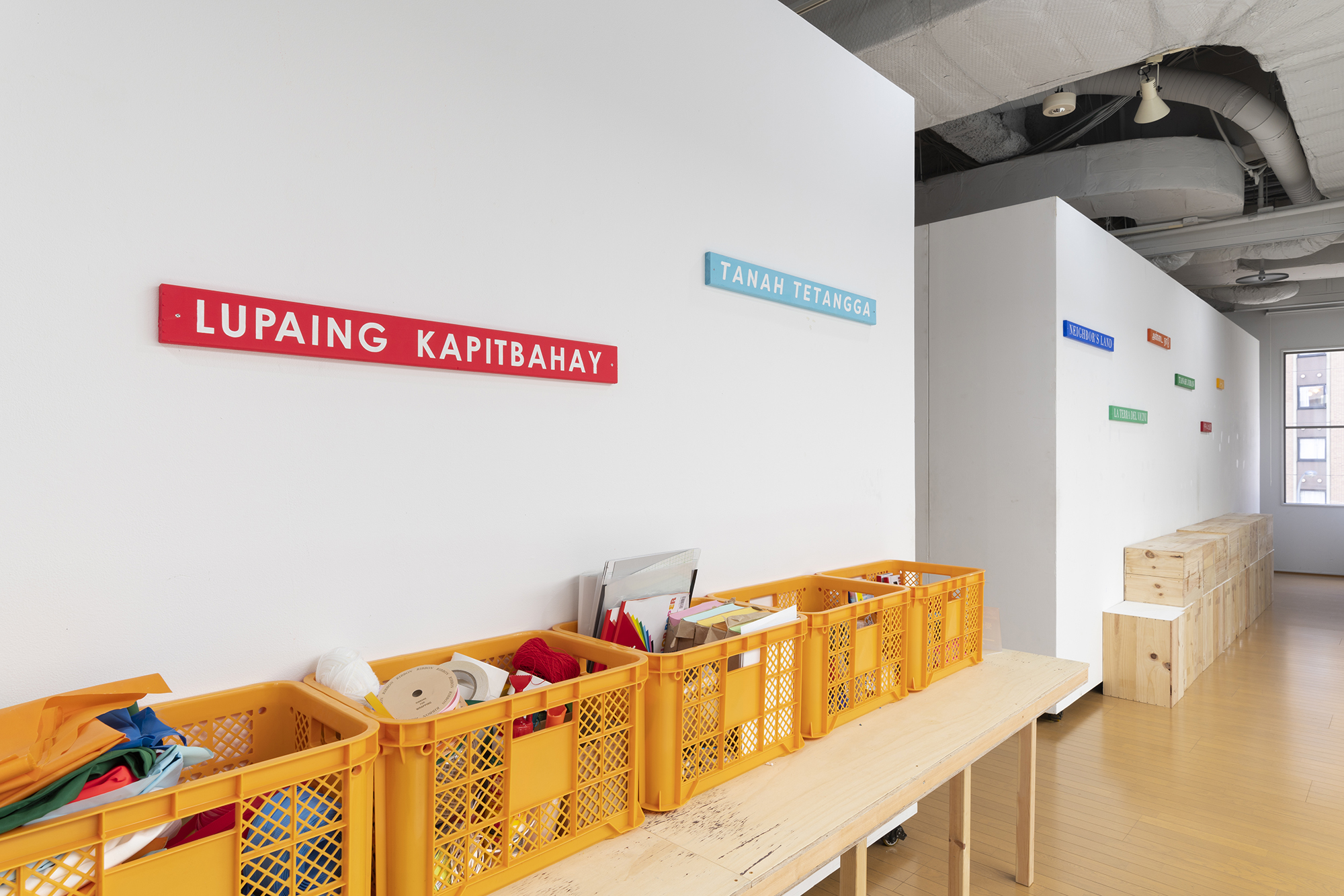
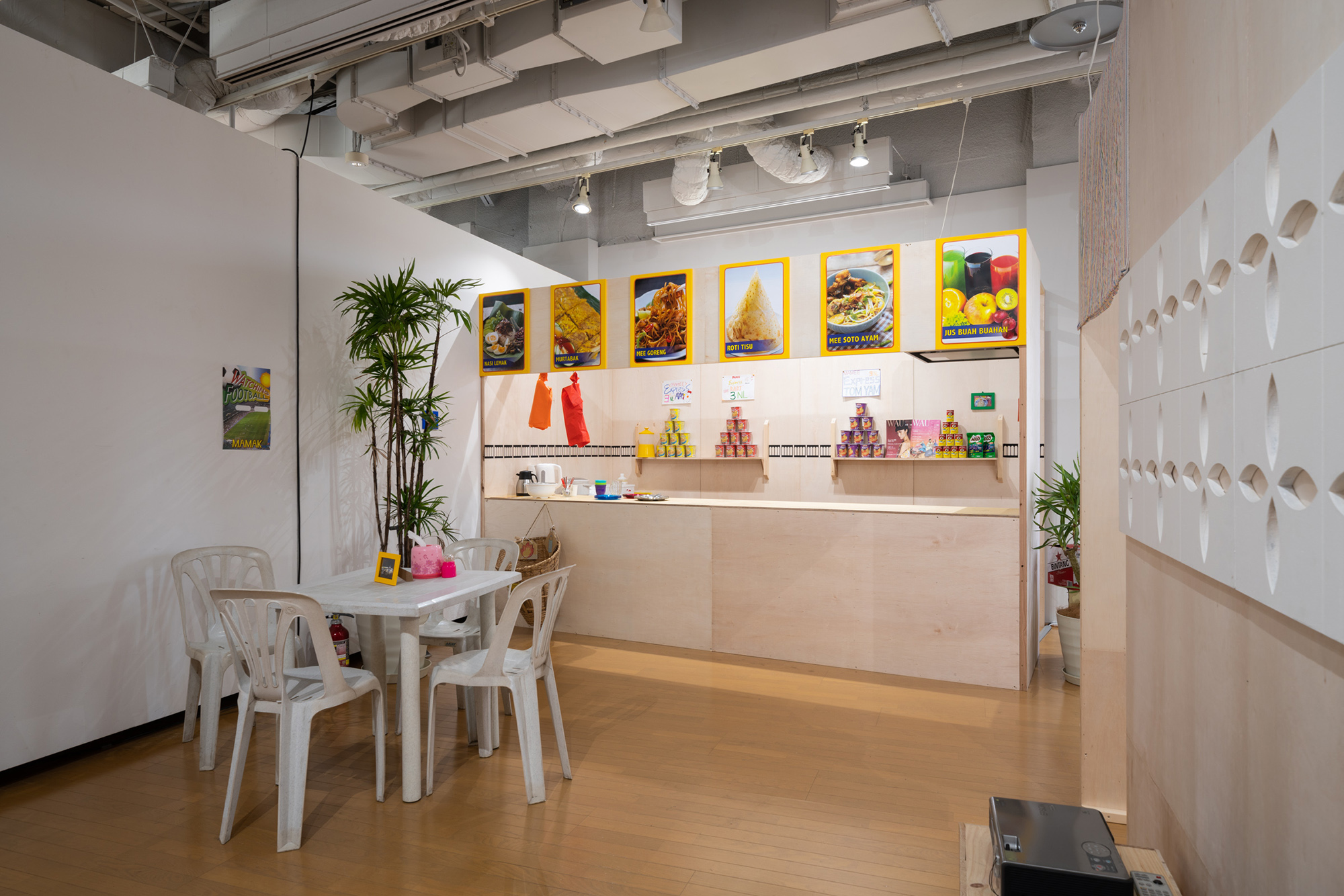
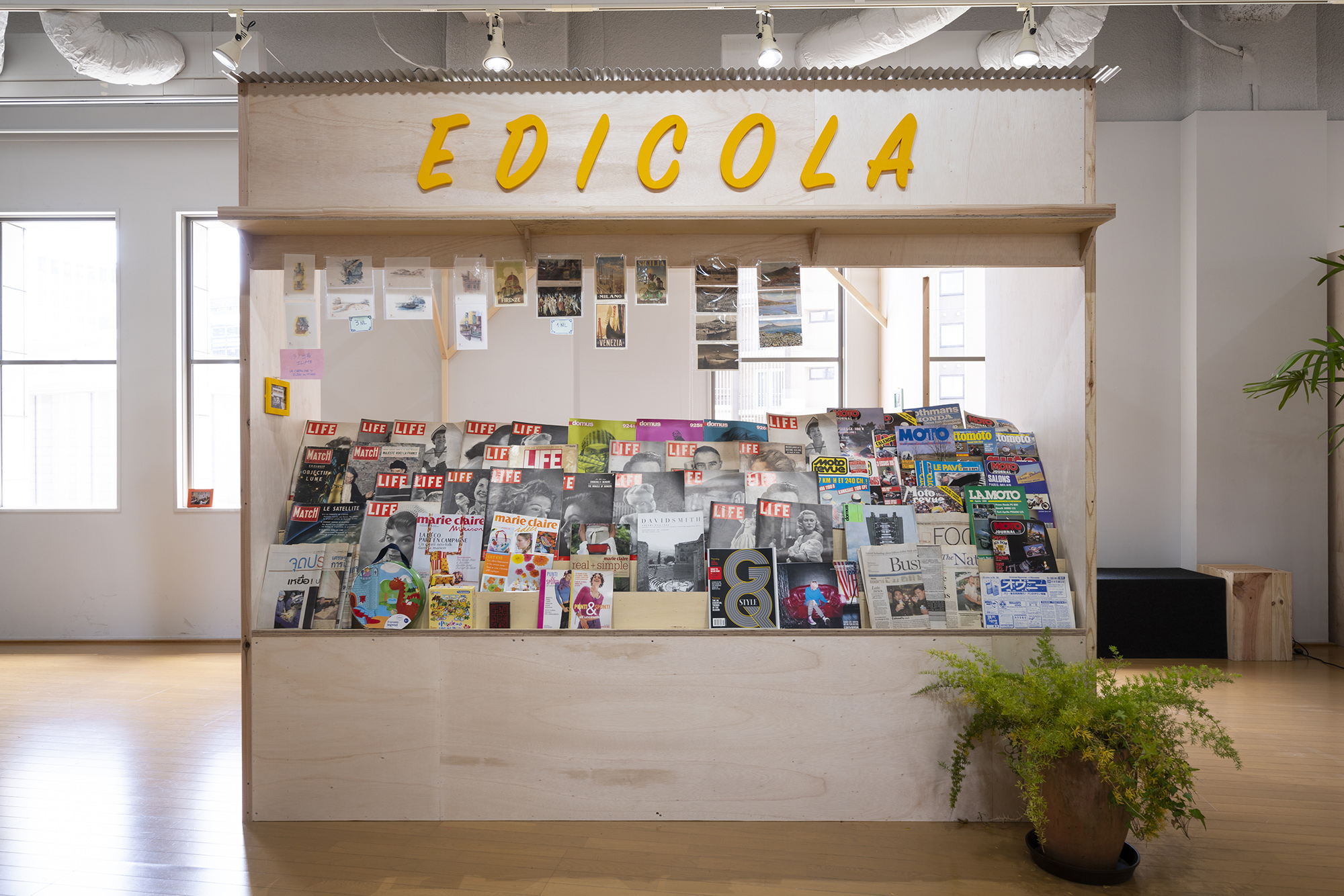
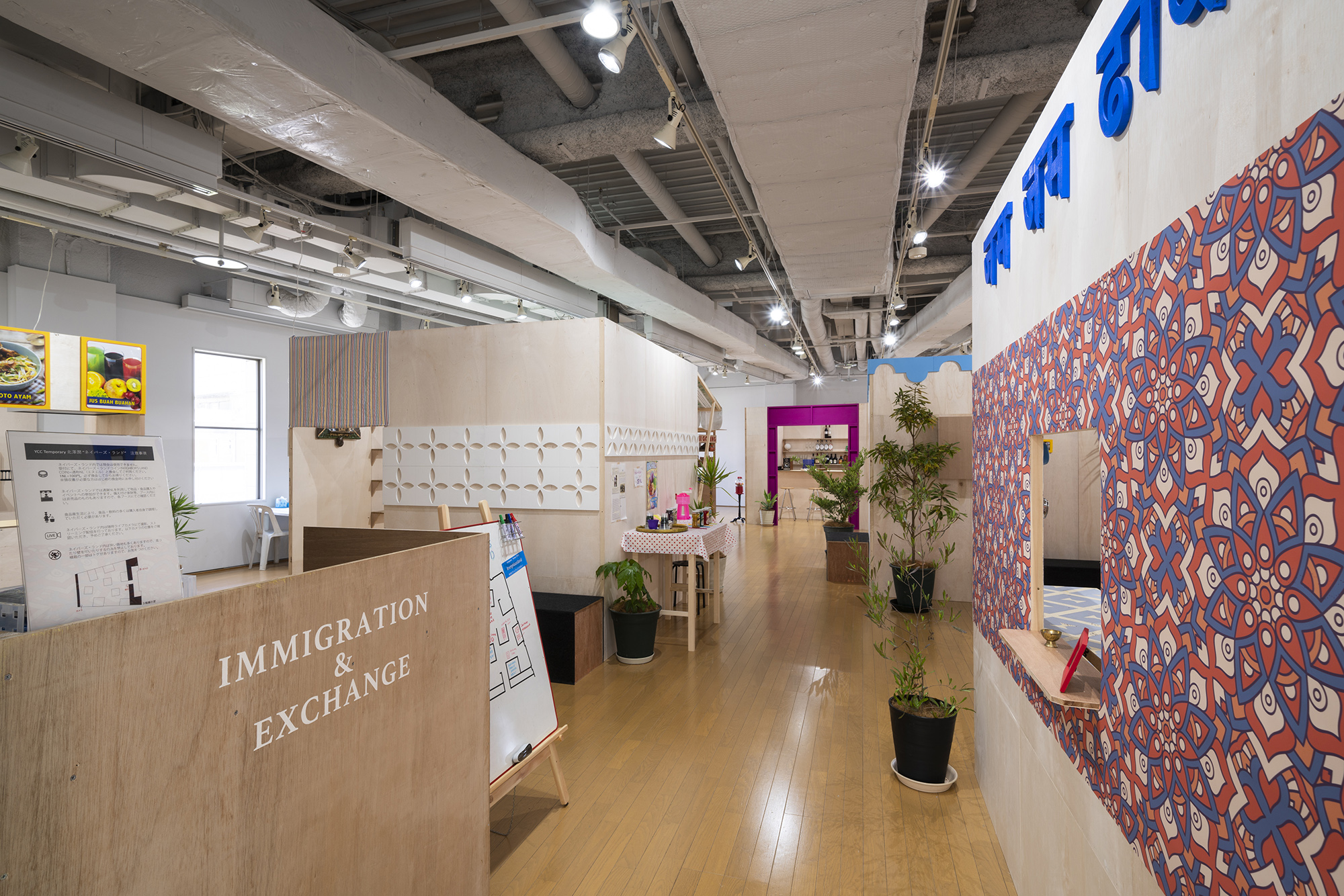
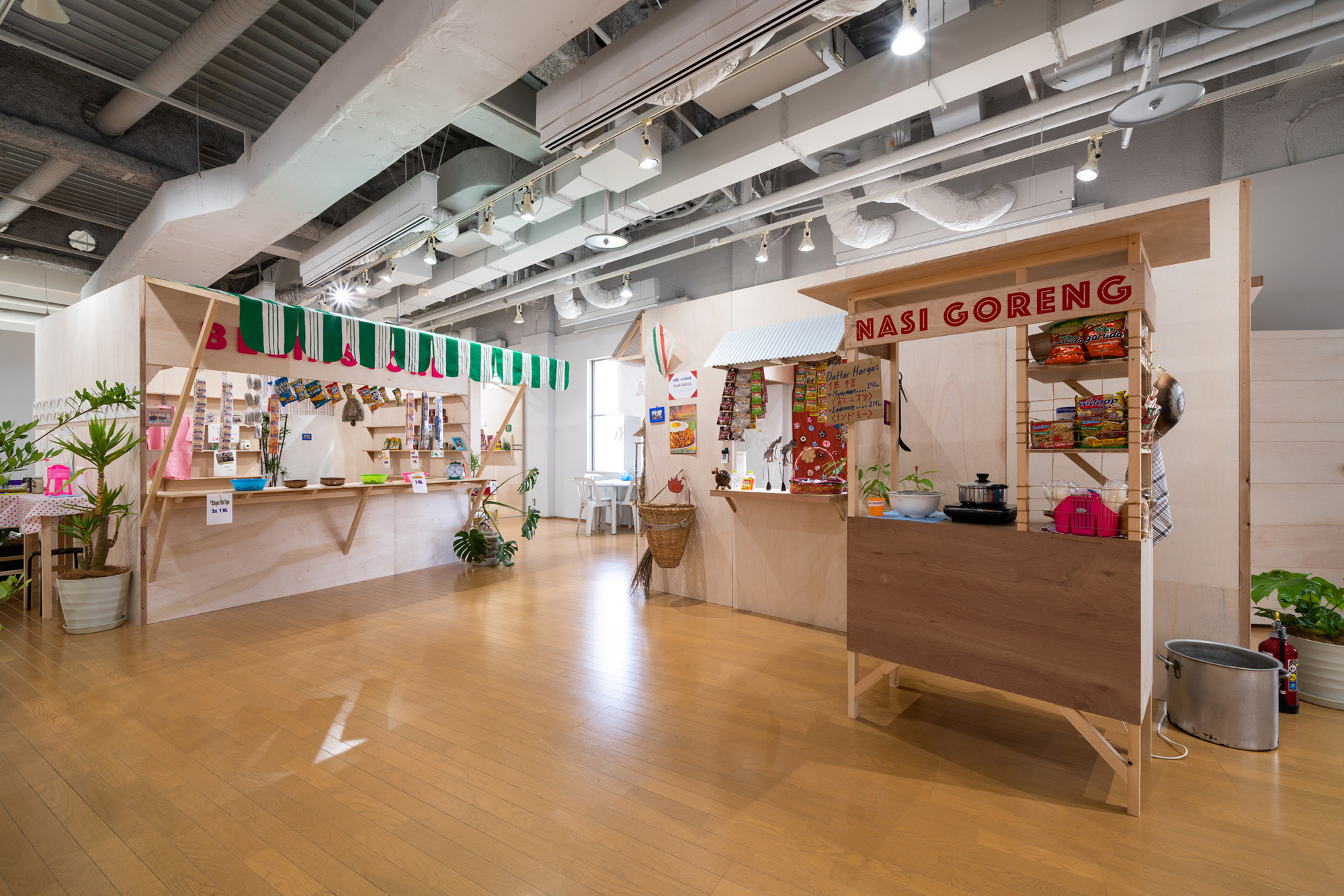
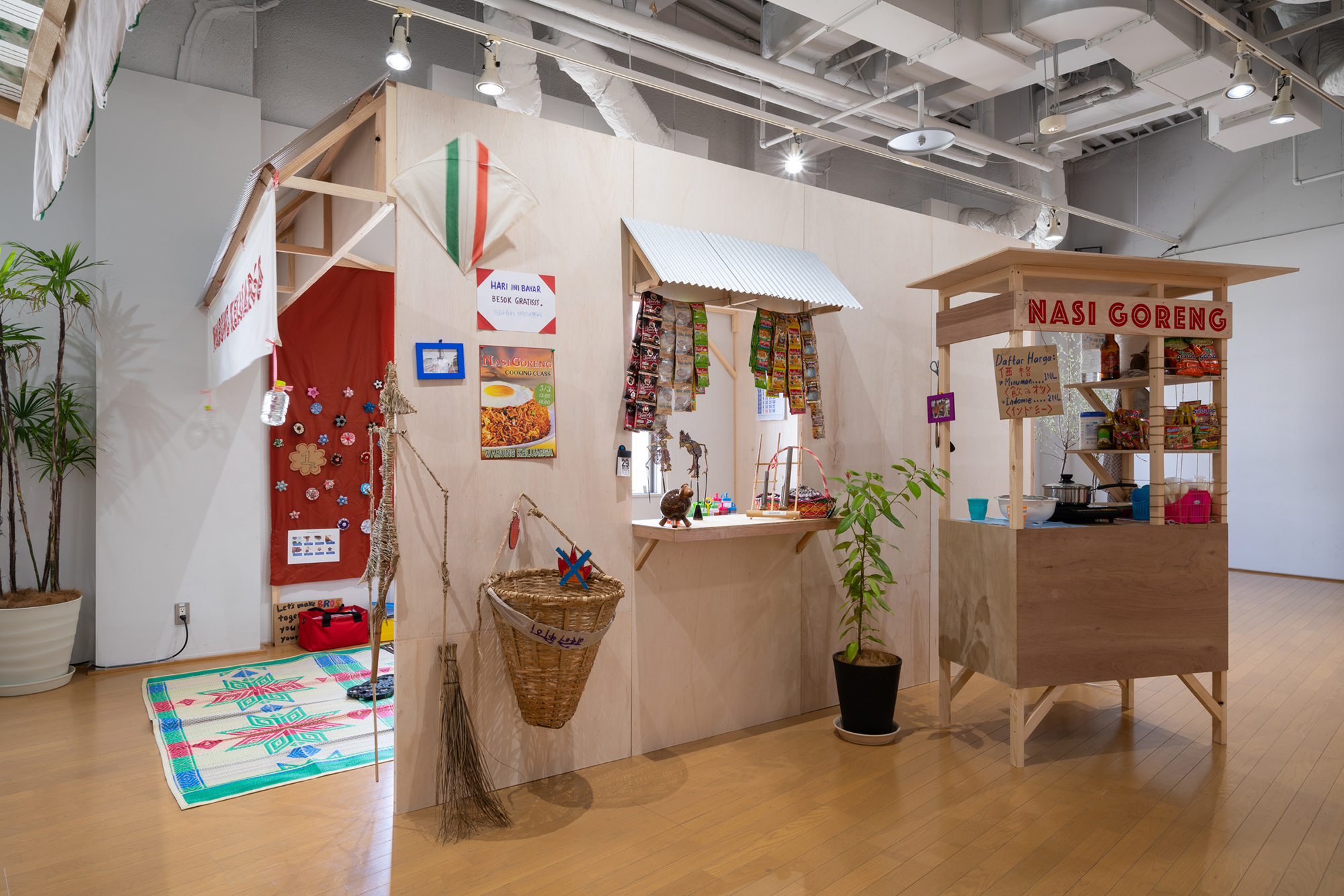
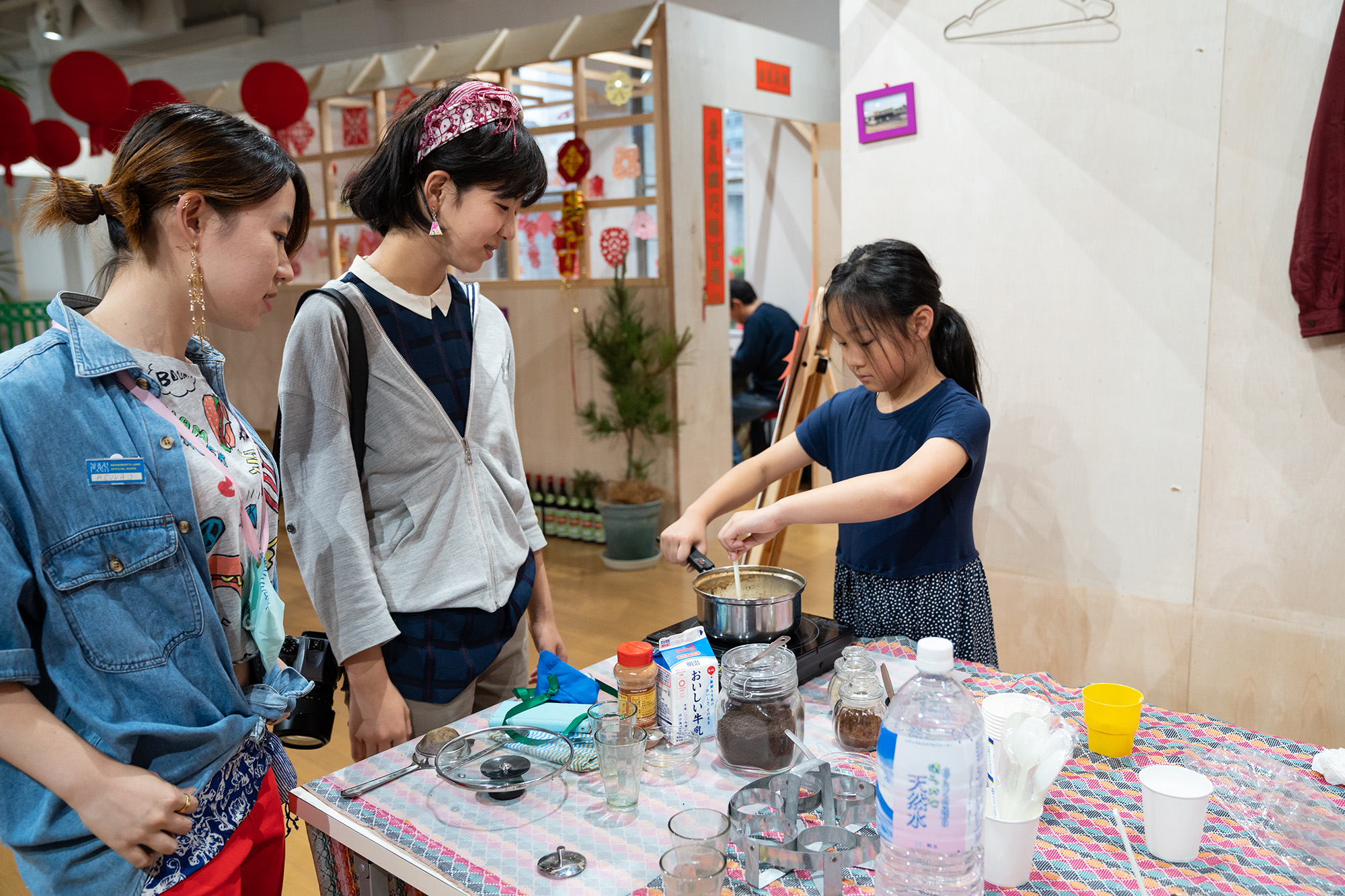
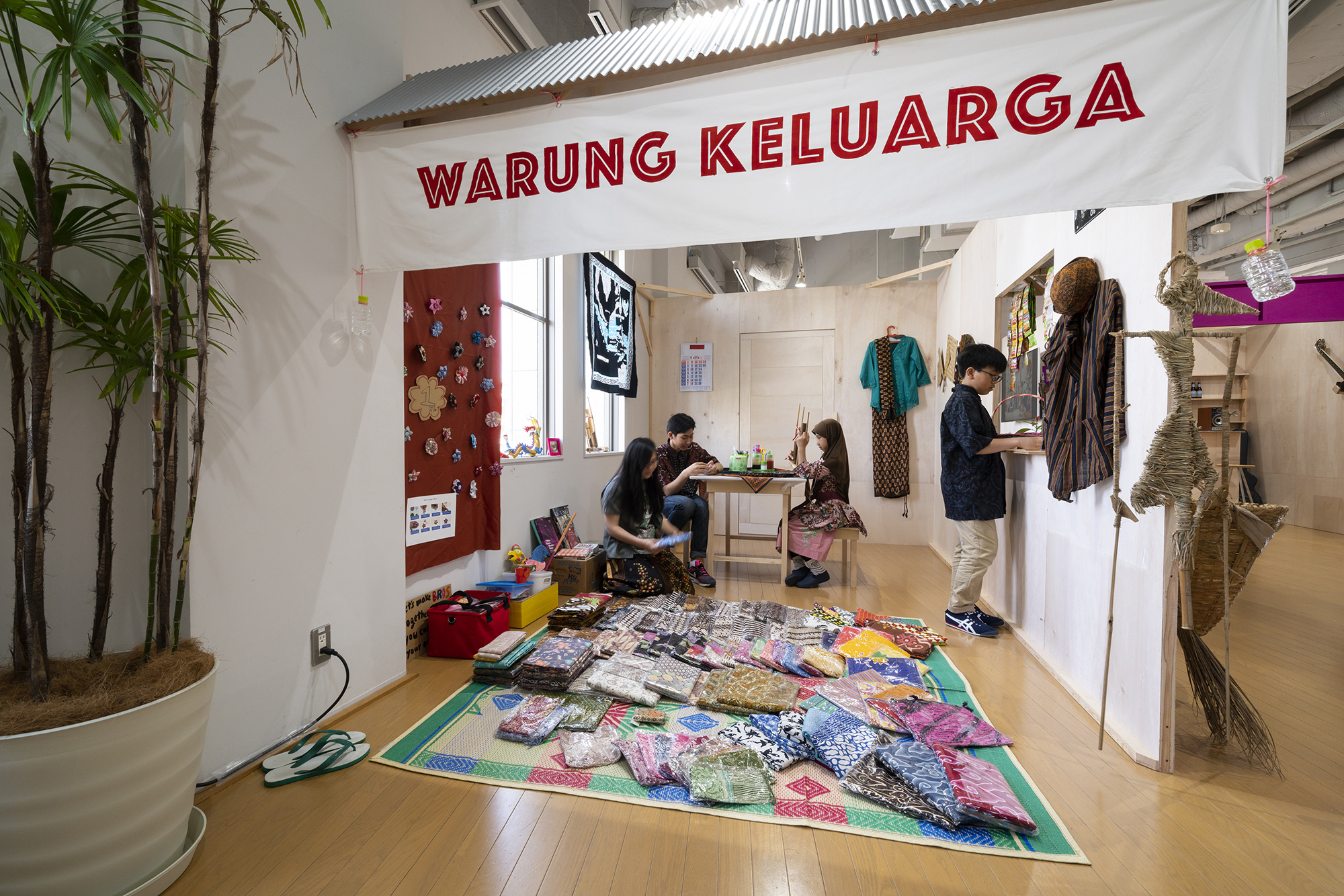
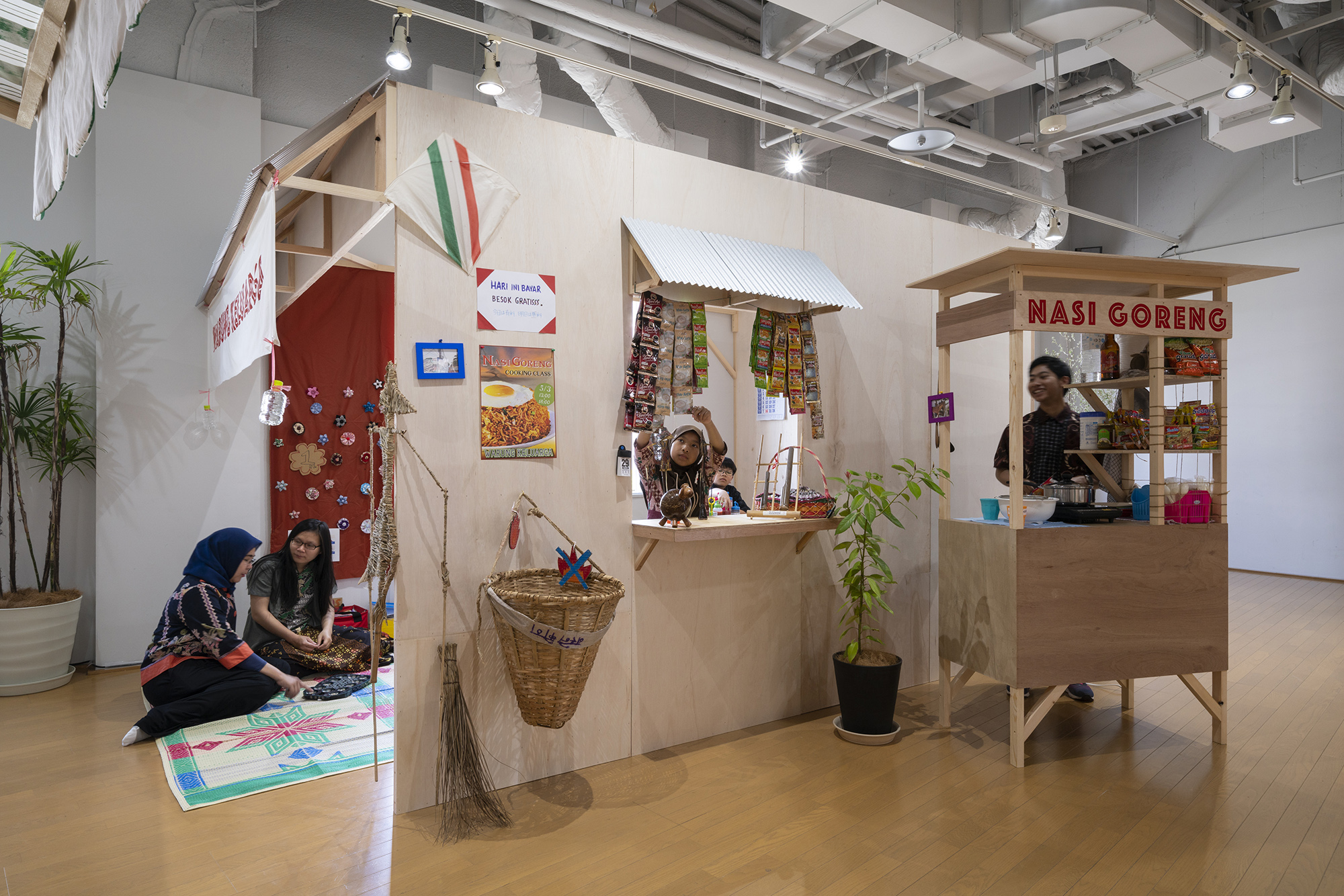
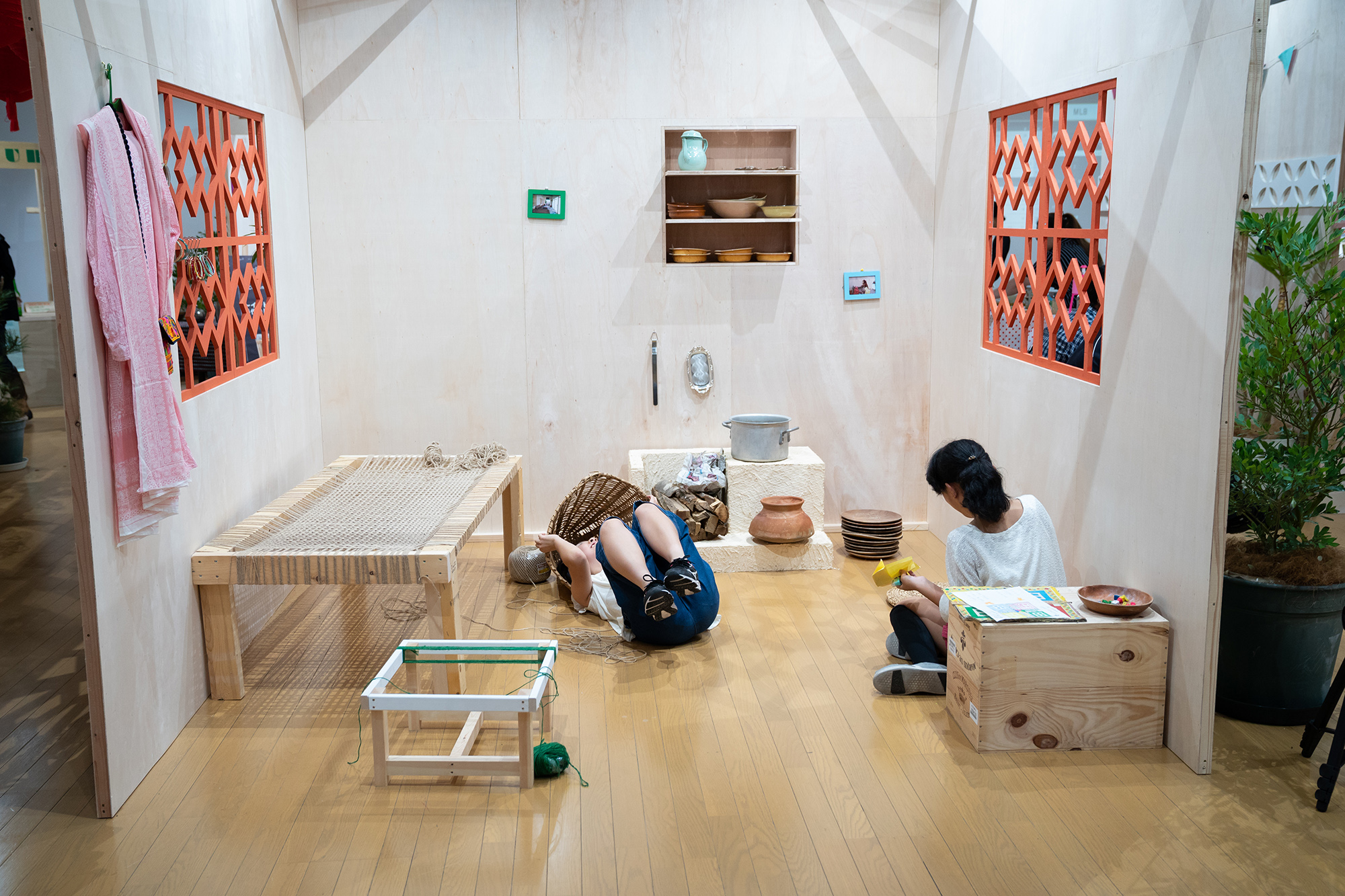
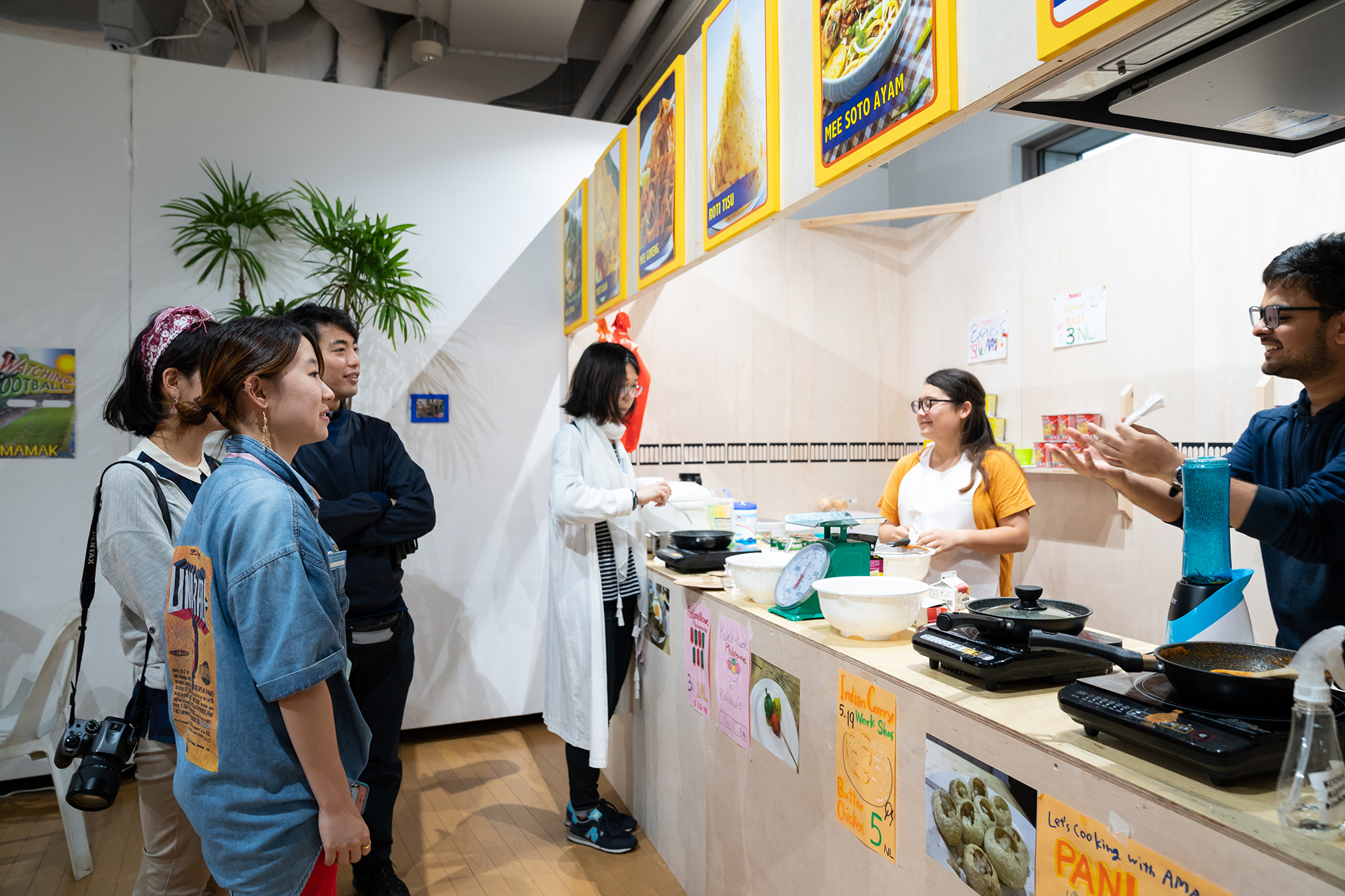
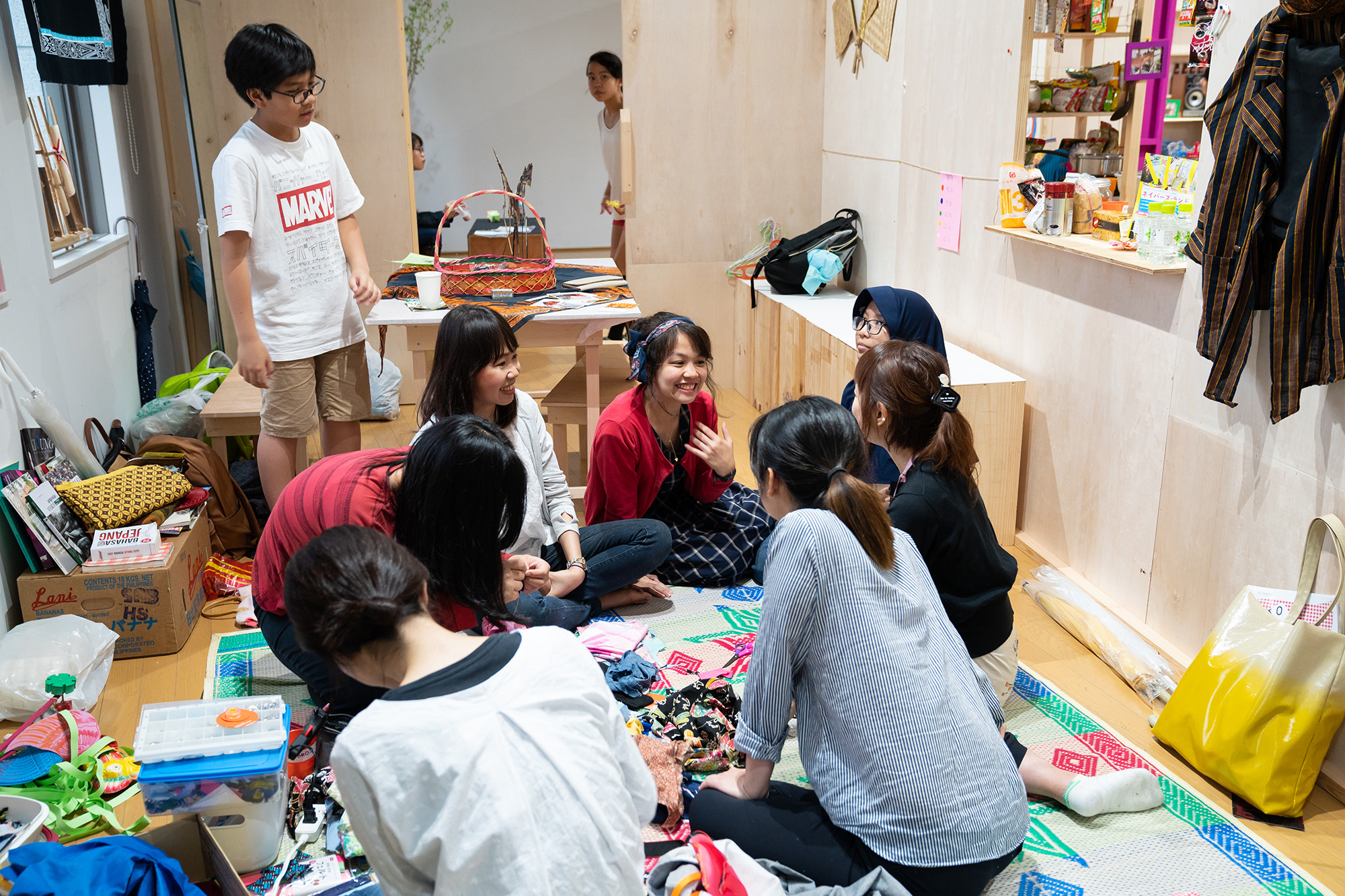
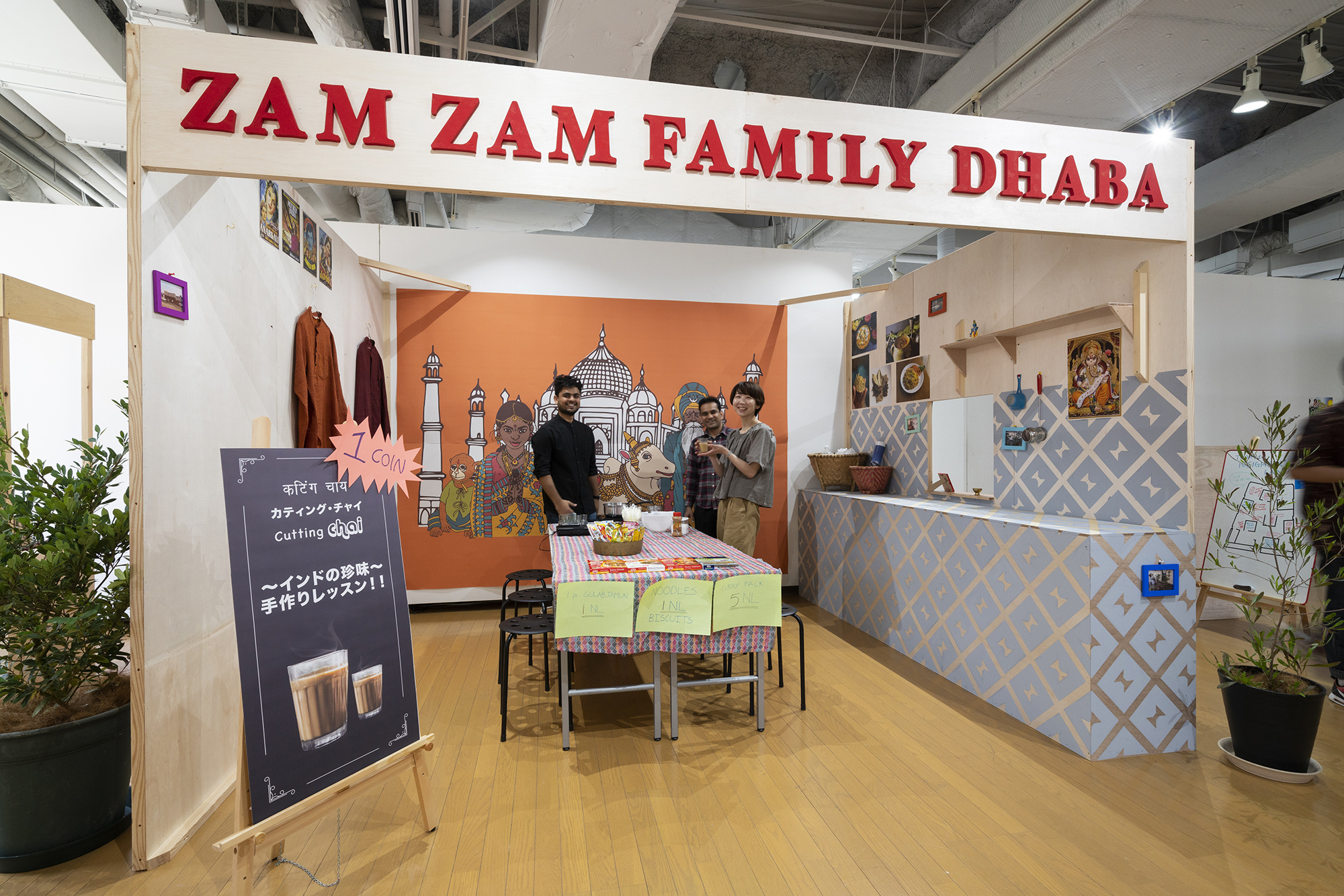
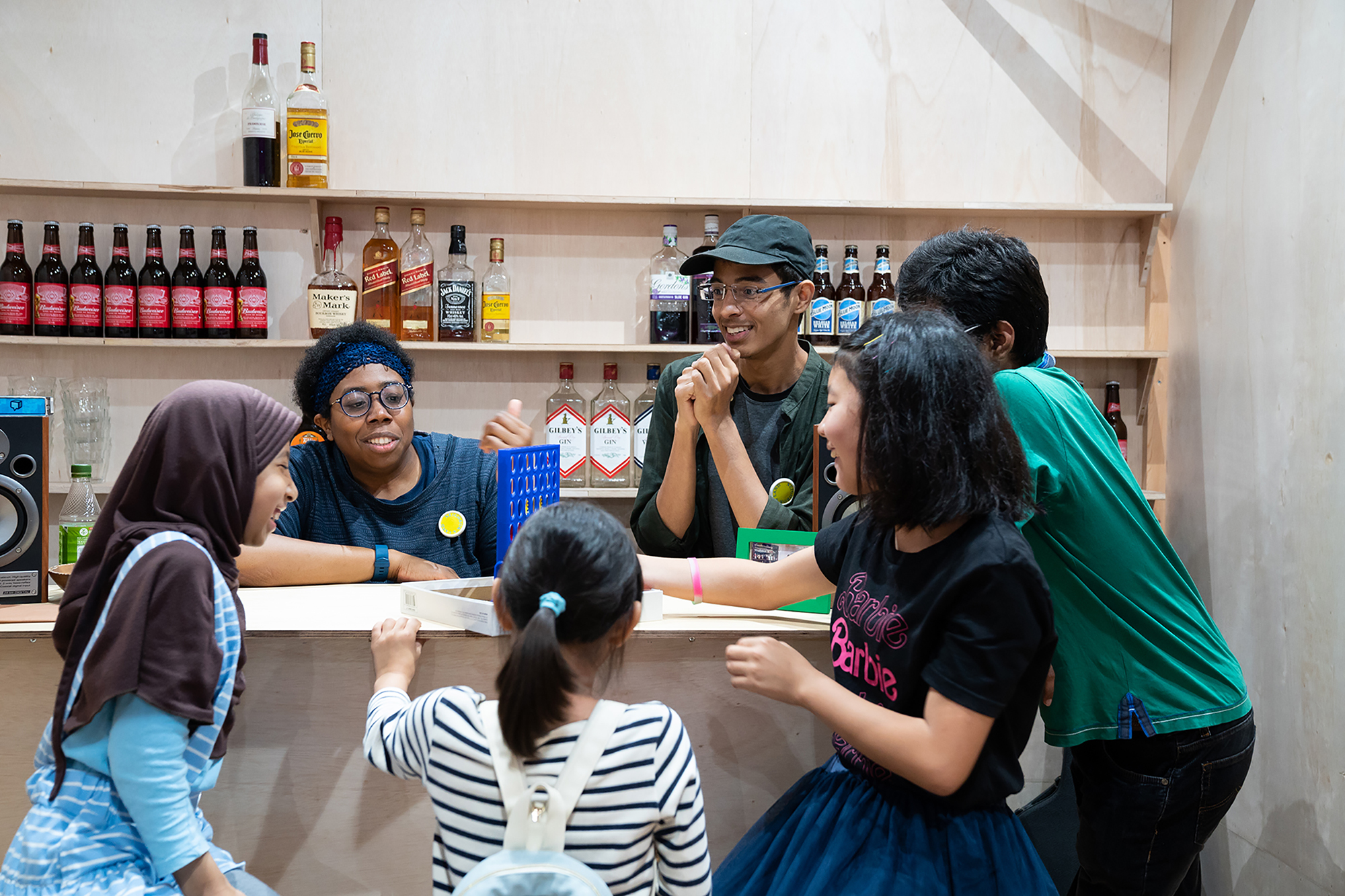
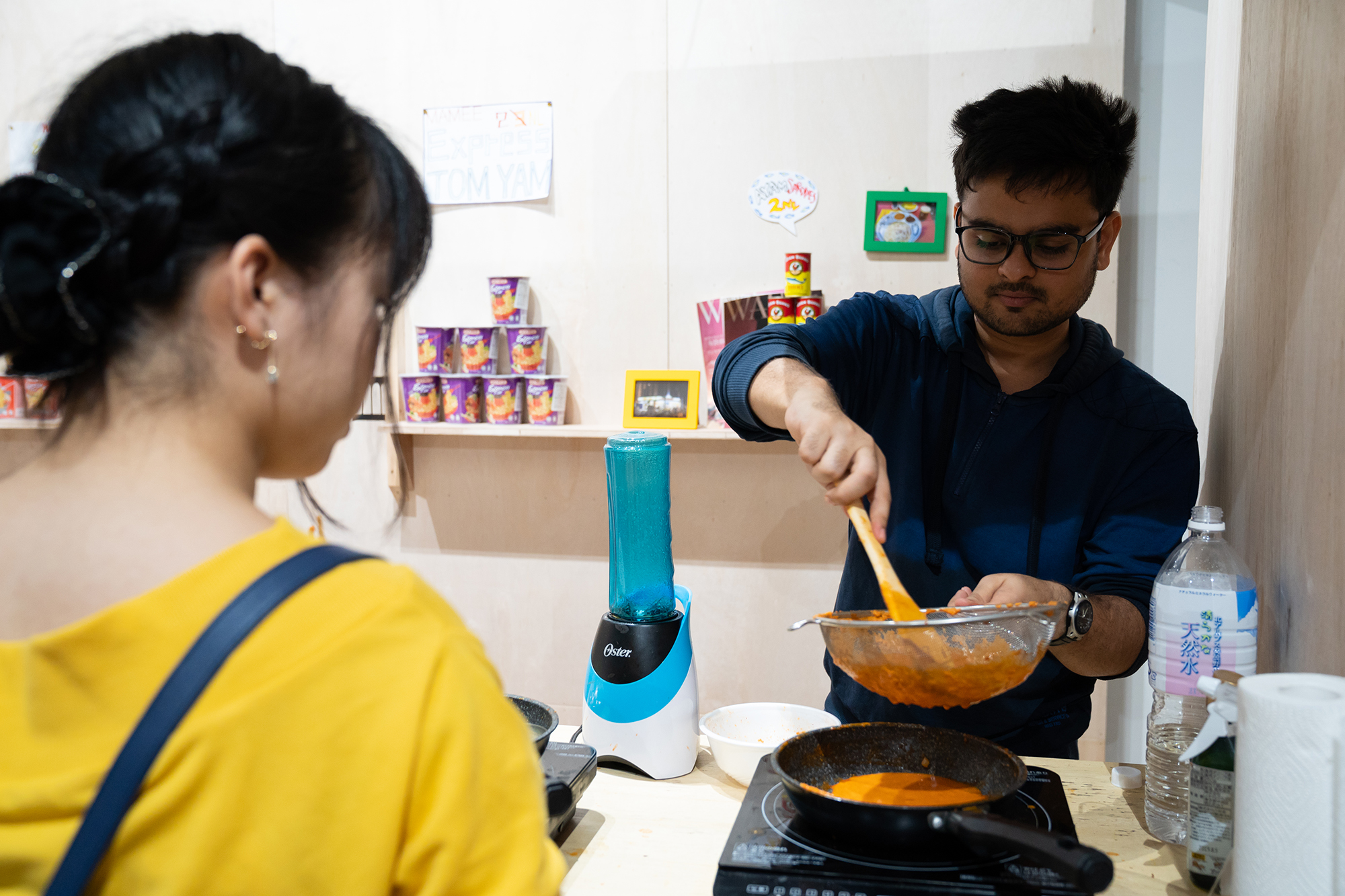

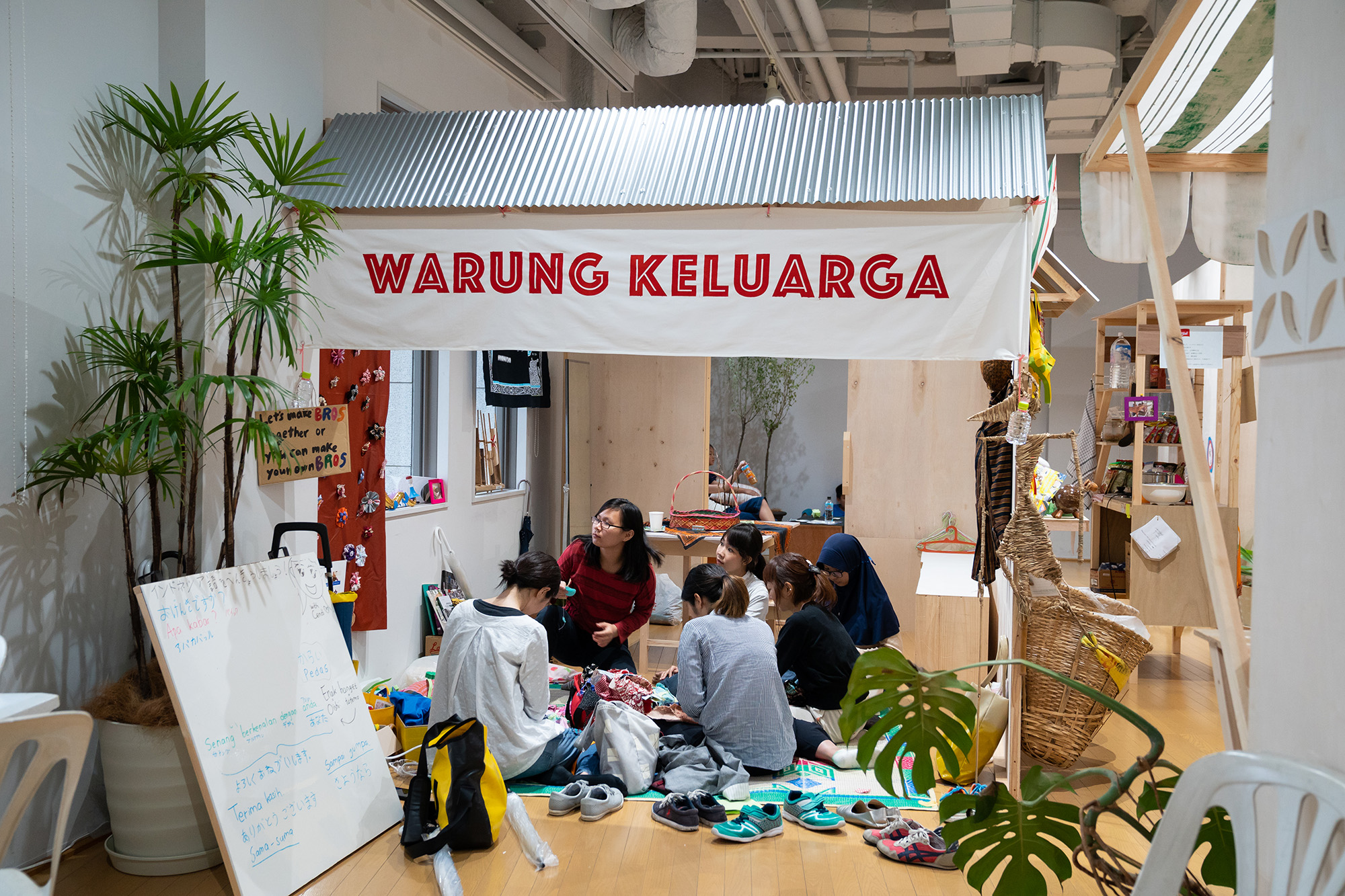
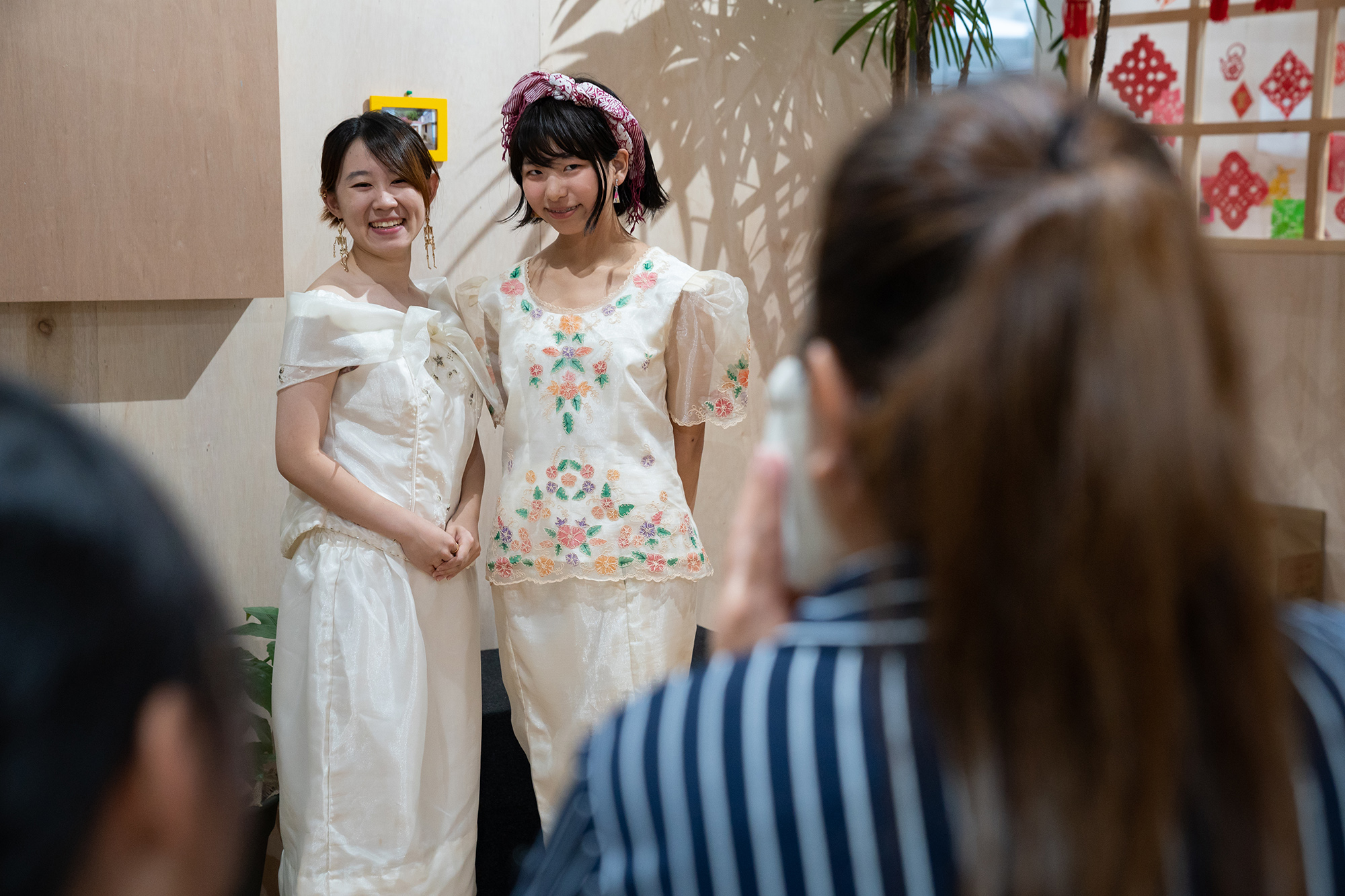
photo by Ken Kato
Outline
The project "Neighbor's Land" was developed as part of the art program "YCC Temporary JUNKITAZAWA" by YCC (Yokohama Creativecity Center).
In this project, I focuse on various “foreign nationals” who live right next to Japanese people as true “Neighbors” in same Yokohama. Although we live in the same land, there is no many chances to know about neighbor’s country, culture and custom. “NEIGHBOR'S LAND” is created by diverse neighbor’s country background and culture at the temporary space. “NEIGHBOR'S LAND”, which looks like somewhere’s “Town” not like town in Japan but actually located in Japan, consists from various foreign national’s activity, people, cultural things and daily goods. The land is going to be where you can meet diverse foreign nationals and also you can find out foreign country’s culture, sense of values, traditional customs and daily life.
概要
YCC (ヨコハマ創造都市センター)によるアートプログラム「YCC Temporary JUNKITAZAWA」の中で展開したプロジェクト、《ネイバーズ・ランド》。
このプロジェクトは、同じ土地で暮らす隣人同士でありながら、それぞれの国や文化、慣習などに触れる機会の少ない、外国人の方々の日常をテーマに、「わたしたち」の生活に共存している多様な「隣人たちの国」を仮設の空間のなかに再構築していく。《ネイバーズ・ランド》は、外国人の方々の出身国の文化、生活、慣習などを知り、体験し、出会うことのできる、多様な人々やモノ、イベントが集まった街のような構成となり、「日本でありながら日本でないどこか(ネイバーズ・ランド)」をつくりだす。
